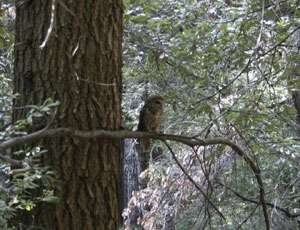
Scientists track the California spotted owl
What effect do changes made to the forest - for wildfire management or timber harvest, for example - have on California spotted owl? That question prompted the organizers of the Sierra Nevada Adaptive Management Project (SNAMP) to incorporate an owl team into its wide-ranging effort.

Project manager Doug Tempel and assistant project leader Sheila Whitmore, both affiliated with the University of Minnesota, said the owls are humanely trapped using a snare pole, a blood sample taken for genetic testing and colored bands attached to the legs for easy identification of the owls in the wild.
Because each owl has a different color band and tab combination, they need never be captured again.
Tempel said one owl pair lives in an area called the "Last Chance." That area will be subjected to Forest Service treatments, then observations by the owl scientists will indicate the impact of the treatments on those owls' lives.
Kim Ingram of UC Cooperative Extension is the SNAMP representative for the northern Sierra Nevada.
She said information from the spotted owl study will be integrated with data collected by other teams to better understand how forests can be managed to ensure sustainable timber resources, minimize wildfire risk to people and structures and conserve wildlife habitat.
Besides the spotted owl team, other teams that are part of SNAMP are:
Spotted Owl
